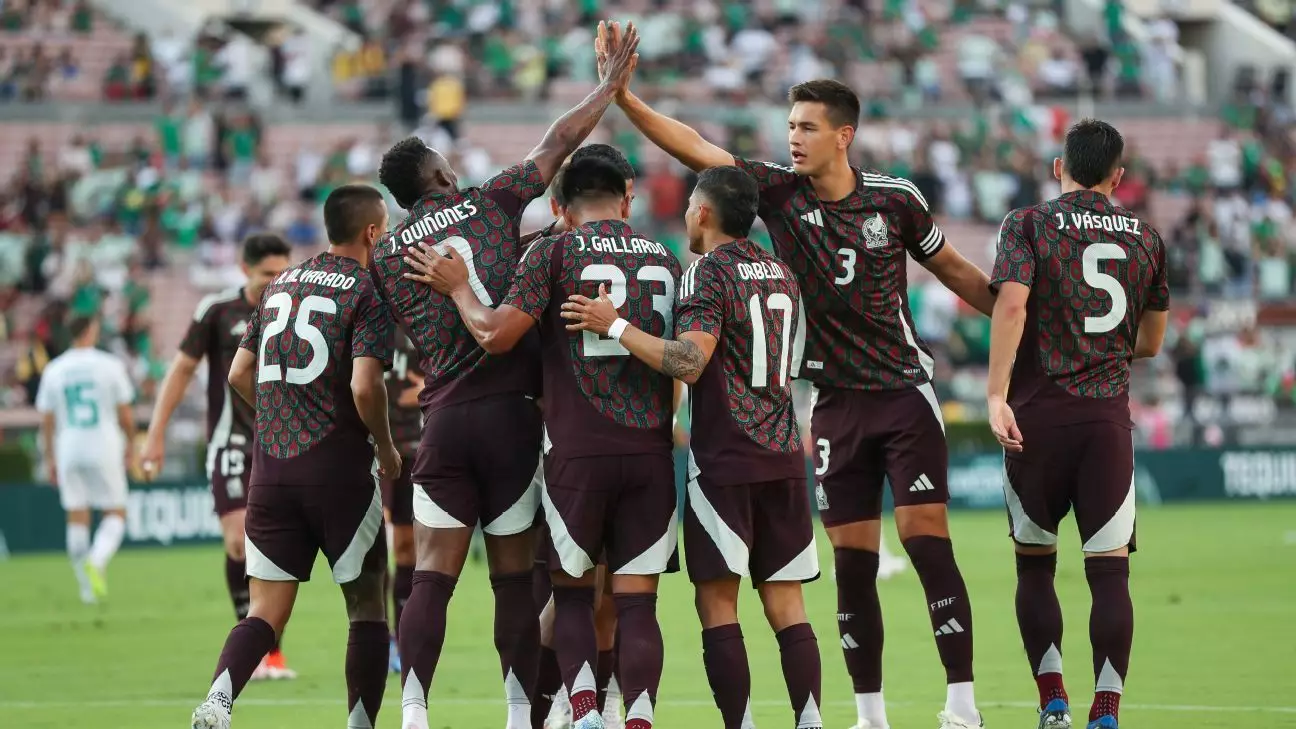The landscape of Mexican football is often met with a blend of fervor and frustration, especially when the national team, known as El Tri, undergoes transitions in leadership. The appointment of Javier Aguirre as the new men’s head coach has generated a sense of cautious optimism among fans, with his return reminiscent of his previous tenures in 2001-02 and 2009-10. Following a lackluster run under former coach Jaime „Jimmy“ Lozano, the early signs of Aguirre’s reign indicate potential for rejuvenation, though the path forward is intricately complex.
In Aguirre’s first matches, Mexico showcased a resurgence of competitive spirit, starting with a decisive 3-0 victory over New Zealand, followed by a goalless draw against Canada. While El Tri fans might find satisfaction elusive, particularly after grappling with defeats and disappointments in recent tournaments, the performance against a lower-ranked New Zealand team sparked a flicker of hope. The players, notably Luis Romo and Orbelín Pineda, displayed a zeal that had seemed dormant under previous management.
Analyzing the energy on display, it’s evident that Aguirre’s influence is already palpable. His ability to ignite motivation is particularly vital when building confidence, given that the team faced challenges just after exiting the group stages of the 2024 Copa América. The criticism faced for their recent performances could be transformed into constructive opportunities under Aguirre’s guidance.
Under Aguirre’s leadership, the emphasis on attitude and aggression became apparent in the friendly against Canada. The team exhibited a physicality previously absent from their play, accumulating 13 fouls and two yellow cards in the first half. Yet, Aguirre’s tactical acumen shone through as he strategically adapted the team’s approach, leading to a more cohesive and assertive second half. The question arises: how can this newfound aggression be sustained as they face tougher opposition?
Duilio Davino, the sporting director, highlighted Aguirre’s knack for motivating players, praising his character. This management style encourages players to push their limits, igniting fires within them at crucial moments. However, this potential cannot be solely attributed to Aguirre—it’s imperative that players internalize this approach to catalyze sustainable results.
Despite the overall positive signs, concerns linger about the attacking prowess of the team, specifically centered around Santiago Giménez. A promising talent, Giménez’s current pain points lie in a frustrating goal drought—14 appearances without a goal for El Tri—despite his successful stint at Feyenoord. Failing to convert opportunities, as seen against Canada, raises questions on whether he can shoulder the expectations placed on his young shoulders. Aguirre’s indifference to a striker’s immediate scoring contribution may be seen as dismissive in the long run, considering the high-pressure situations Giménez will face in crucial matches.
As an emerging star, it is imperative that Giménez breaks this unnerving cycle. The absence of scoring could hinder his confidence and, by extension, the team’s dynamics. While Aguirre maintains that the team’s collective performance is of higher importance than individual accolades, the scrutiny on Giménez will undoubtedly persist.
One of the standout features of Aguirre’s initial games has been the strength of Mexico’s defensive unit. Against Canada, the team restricted their opponents to an expected goals (xG) tally of just 0.26, a testament to a cohesive backline supported by players like César Montes and Johan Vázquez. Furthermore, Aguirre’s collaboration with former Barcelona player Rafa Márquez as assistant coach has fortified their defensive schematics. This combination of leadership is promising, particularly when engaging in high-stakes fixtures.
Goalkeeping also proved critical during this international break, especially Luis Malagón’s commendable save against Canada, preserving the team’s clean sheet. Defensive efforts have revitalized El Tri’s identity, hinting at a blueprint that could elevate them back into contention among football’s elite as they progress through upcoming competitions.
Amidst these tactical evaluations and player assessments sits a complicated relationship with the fanbase. Attendance at recent matches has faced scrutiny, with a mere 25,271 spectators for the match against New Zealand in an arena designed for capacity crowds. While the oppressive heat during that particular weekend doesn’t help, wavering support raises alarms about the direction of Mexican football. It’s essential for Aguirre to connect with the fans, as they are crucial in creating an electrifying atmosphere and promoting a positive aura around the squad.
The challenge ahead not only lies in player performance and tactical execution but also in rekindling that spark of passion among the supporters—a task Aguirre will need to address as he molds this new era of Mexican football. The foundation for success is being laid; how it is nurtured from here will dictate whether El Tri can recapture the hearts of their extensive and loyal fanbase. The journey ahead is demanding, but the opening acts of the Javier Aguirre era suggest that a revitalization is on the horizon, blending optimism for the future with the lessons of the past.


Napsat komentář